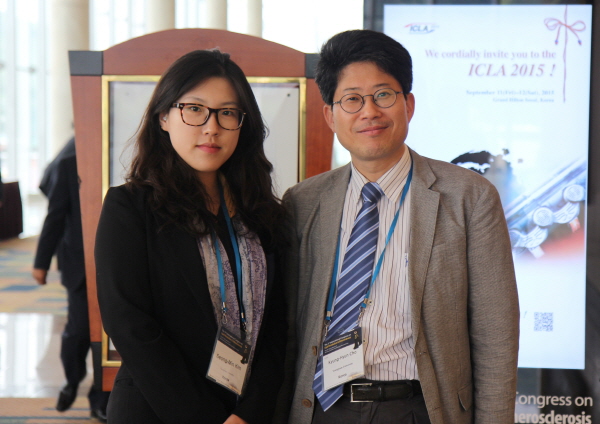Presentation of recent research results at the '3rd International Congress on Lipid Metabolism & Atherosclerosis' oral presentation session
Investigated mechanism of inflammation suppression effects of high density lipoprotein
[September 30, 2014]
<Researcher Kim Sung-min (left) who won the best presentation award at the 3rd International Congress on Lipid Metabolism & Atherosclerosis
Researcher Kim Sung-min (26) of the YU BK21 Plus Blood Serum Bio Medical Project Team (Director Cho Gyeong-hyeon, Professor at the School of Biotechnology) won the 'Best Presentation Award' at the '3rd ICLA (International Congress on Lipid Metabolism & Atherosclerosis)'.
This academic conference, which is celebrating its third year, is an international academic conference on lipid metabolism and atherosclerosis. Every year, domestic and foreign scholars are invited to introduce and present the latest research results in basic, nutrition, epidemiology and clinical studies, while providing the opportunity to discuss the subjects to greatly contribute to the development of Korea's lipid metabolism and atherosclerosis sectors.
This event was held at the Seoul Grand Hilton Hotel Convention Center on the 12th and 13th where over 400 lipid metabolism and atherosclerosis experts from over 20 countries attended to display and present approximately 100 theses. In the oral presentation session that Kim participated in, 12 teams from Korea, Japan, China, Taiwan and Malaysia participated to present the latest research results. Kim was awarded for his presentation on 'Investigation of inflammation suppression effect mechanisms of high density lipids (HDL)'.
Kim confirmed that the mechanism in which anti-inflammation occurs from blood serum HDL that are beneficial to the human body became mediums through specific cell receptors. He also found that harmful HDL transformed due to saccharification promoted inflammations and worsened diabetes and atherosclerosis.
Kim said, "These research results can be used to treat heat diseases, Alzheimer's and diabetes by applying in bio drug development that treats blood diseases, and can also contribute in studies on mechanisms that occur in diseases related to old age." He added, "In addition to blood serum lipoprotein studies to treat heart and blood diseases, I will also concentrate on research to improve the functions of proteins that can be used as treatment like HDL."
Meanwhile, Kim, who graduated from the YU School of Biotechnology has been continuously conducting research on treatment for atherosclerosis and hyperlipidemia since he was a junior. In particular, in December 2010 prior to his graduation, he was selected as a scholarship student for the National Research Foundation's 'national scholarship program for exceptional students' and also won a science and engineering national scholarship student research reward. Meanwhile, he completed his combined master's and PhD program majoring in animal and medical bioengineering at the YU Graduate School of Biotechnology and is currently working at the YU BK21 Plus Blood Serum Bio Medical Project Team.










